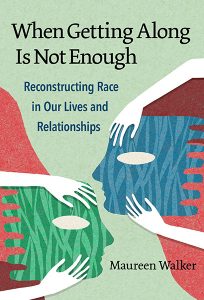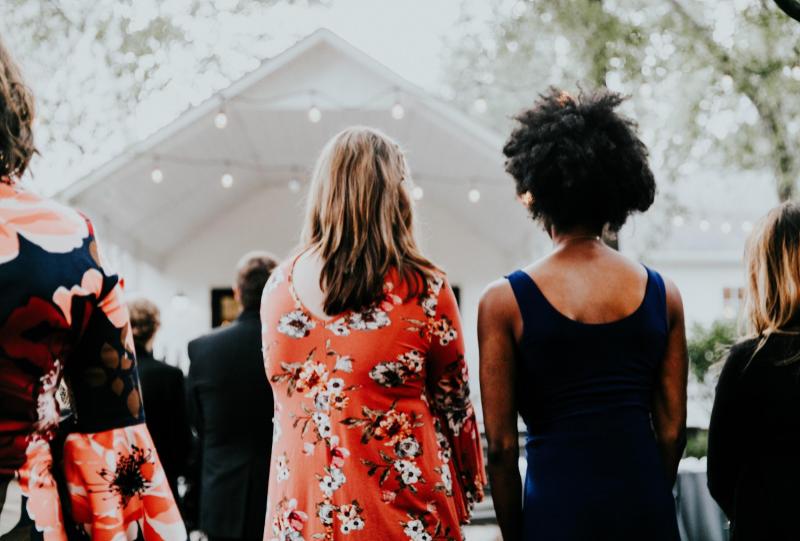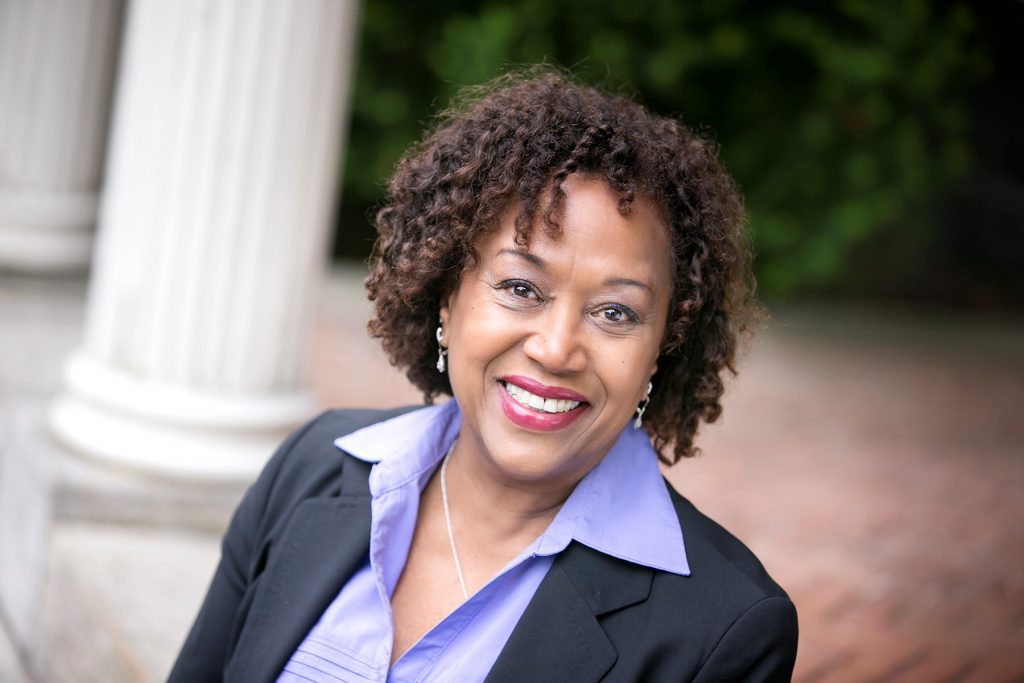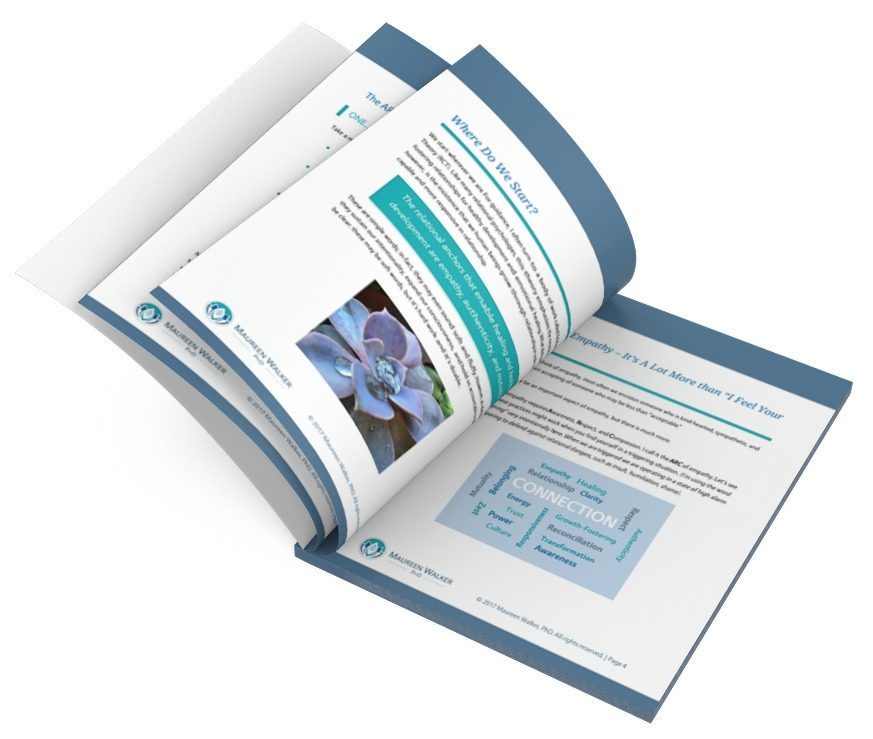Sometimes when bad things happen, the need to do the right thing becomes all the more urgent. The election of the 45th president (which I unequivocally experienced as a bad thing) shattered any illusion that just “getting along” as racialized beings is enough. “Just getting along” does not and cannot foster an expansive imagination of how we can live and who we can become as sentient, earth-dwelling creatures. This sense of urgency is how I decided – after years of dithering – to begin writing in earnest about how we live race in our 21st century North American culture. My new book, When Getting Along Is Not Enough, is my effort to begin a conversation that helps us to remake the meaning and functions of race in our lives.

In spite of the pervasive and seemingly intransigent cultural mythologies, we have long known that race is not so much who we are, but what we do. Furthermore, we all too often do race without talking or even thinking about what we are doing. To some extent, it is the not thinking and not talking that make race such a serviceable “power-over” tool of disconnection. So long as our biases remain implicit, tucked away in the nether regions of consciousness, we can enact them without disturbing our American way of life. Of course, “not talking” isn’t the only way we perpetuate chronic racialized disconnections. Sometimes our talking functions to distort the political realities and the emotional experience of race, either through hate-stoking exaggeration or escapist equivocation. On one extreme, racial stratification is posited as not only the necessary thing to do, but the right thing to do. On the other, racial stratification is dismissed as either non-existent, or as a misunderstanding – a cultural “misstep” that can be corrected if we all smile and talk nicely to each other. Although the latter approach might allow us to get along, it is actually a strategy of disconnection: a tactic that enables us to maintain the appearance of connection by withholding vital aspects of our experience out of relationship. What is lost is the opportunity to heal ever-morphing wounds of a racially divided culture. What is diminished is our desire to cultivate authentic, growth-fostering connections with other humans.
The Law Student and Mr. King
Many of us remember Rodney King’s tearful plaint: “Why can’t we all just get along?” That these words came from a man who had been twice victimized (first by the beat-down from the police and second by the jury that justified their brutality) lent a certain poignancy to his plea. While one might wonder why and who facilitated Mr. King’s role as the convener of a press conference, there is no reason to doubt his sincerity. To be fair, there are times when just getting along is all we need to do; not every cross-racial interaction needs to be an encounter of the close kind. (For example, sometimes we just need to pay the cashier for our groceries and leave the store). However, Mr. King’s plea speaks to deeper, more consequential realities. When we take his question seriously – that is, when it is a question and not a rhetorical device – it is a call to a cultural reckoning. It is a call to reckon with the enmity, fear, and suspicion borne of the racialized power arrangements that we have come to view as normal in everyday life. These are the power arrangements that not only determine access to cultural resources (e.g. potable water, quality education, personal safety, mentoring relationships), but also impose limitations on how those resources may be used once acquired. For example, research has consistently shown the worth of a college degree to be a racialized measure. This differential is not an anomaly; it is a predictable outcome in a culture where race functions as a signifier of deservingness and human worth. Furthermore, as more than a few students of color can attest, admission to elite law schools or doctoral programs in no way exempts them from racialized indignities and physical endangerment. In one instance, an African American law student reported that he was accosted by campus police as he attempted to enter his dormitory, presumably because he “resembled a suspect in a robbery” that happened off campus in a neighboring town. The compounding indignity came from campus officials who cautioned him to be polite when he attempted to report reported the violation to them. Although separated by generations and contextual privilege, this young man and Rodney King walked the same racial tightrope: to voice their pain while preserving the comfort of the culturally dominant class. Mr. King’s plea reveals an irony characteristic of a racially stratified culture: those who are deemed less worthy are typically held responsible for ensuring that we all just get along. However, when we obey the cultural mandate to just get along, we are likely buttressing the force and effect of unjust, cross-racial power relations.
Unjust power relations manifest across a wide range of institutional processes, cultural norms, and individual choices: from imperiling the life and liberty of culturally subjugated groups to subjecting those groups to the indignities of derisive humor. Any resistance or challenge to these violations is likely to incur some level of backlash, be it extrusion from a social circle or some more drastic form of neutralization. When racialized injustice is a cultural norm, the path of least or no resistance (i.e. just getting along) may present itself as the most expedient option. It is not, however, the option that expands our vision of who we can be in the world; instead, it forces us to enact the legacy of choices made by dead people, starting with our “Founding Fathers” who decided that racial categorization would determine the measure of human worth in these United States.
What to do about the dinner party guest?
We can make different choices – choices enabled by our neurologically wired need to thrive in authentic connection with others. These choices start with acknowledgement that being-in-relationship is how humanity evolves. And we do have to choose. The path of least resistance is disconnection – just getting along. We can choose to cultivate the relational competencies that enable us to participate in growth-fostering and healing connection. One of the anchoring competencies is one I like to call Mindful Authenticity. Let me emphasize the word mindful. It signifies a pause, an intention to fully gauge the context and consequences of an interaction. The crassness of our current political discourse is such that rage-tweeting and bumbling incoherence are sometimes cited as evidence of authenticity. In contrast, Mindful Authenticity is marked by the ability to express emerging truths as they evolve and can be borne in a specific relational context. Mindful Authenticity is both a skill and a mindset, and as you probably suspect, does not offer a sure-fire, quick-fix resolution to conflict. It does, however, provide a portal to clarity and new possibilities.
Here is a story told by a dear friend and mentor whom I call “David” in the book. The setting was a dinner party that David and his wife hosted for a small group of friends, and it beautifully illustrates the core principles that underlying the practice of mindful authenticity. Although their political predilections were wide ranging, what the guests shared in common was retirement from their respective professions, financial affluence, and White racial identity. Over the course of the evening, the topic of race relations surfaced, prompting one guest to voice his disdain for the young Black men hanging out on corners. In fact, he opined, “they would be better off as slaves.” I can imagine that this comment sent shock waves through this genteel gathering, but I don’t know how anyone responded in the moment. As I recall the story, my friend said nothing… for a day or so. He then called his guest to express his disagreement and his disappointment upon hearing the level of racial vitriol his guest had chosen to express in his home. Before the conversation ended, David made it known that while his guest was free to harbor his chosen hostilities, he was not free to flaunt them in his home.
I can imagine that some readers of this anecdote can quickly imagine how much more forceful and immediate their resistance would have been. So be it: there is no one right way to practice authenticity. However, there are three principles that distinguish authenticity from knee-jerk reactivity. I call these the Three C Mindset.
First, there is consideration – of the purpose, timeliness, and tone of the interaction. Regarding purpose: before any potentially consequential interaction, it is probably always good practice to ask oneself: “why am I talking?”. What we notice first about David’s response is that he paused. By pausing for a beat (or for several beats), we allow ourselves time to consider what we hope to accomplish in the exchange. Is the purpose to gain clarity? To silence? To convert? Whatever the purpose, mindful authenticity begins with consideration of our own internal experience – the thoughts, emotions, and expectations motivating our response. This pause also allows us to consider the timeliness of the response. Is the family holiday dinner the best place to excoriate “Cousin Mildred” about her “off color” jokes? Maybe so; sometimes Cousin Mildred just needs to shut up right now. Be that as it may, we must still consider how we respond to her, where we engage her, and with what tone.
Second, there is courage. It would probably be easy to speak truths if we could do so with a sense of invincibility. However, rarely do we feel completely prepared to take on authentic conversations about race. Courage is required to speak our incomplete truths, and to do so imperfectly. That means we have to relinquish any notions about “winning” the conversation or appearing “fiercely woke”. Furthermore, courage is required to accept the likelihood that truth-telling will disturb the false comforts of just getting along. No matter how mindfully it is done, few people are going to say, “thank you”.
Third, mindful authenticity requires engagement with complexity. In short, it requires us to widen our relational lens, accepting the reality that there is always more to all of us than can immediately be seen. “Cousin Mildred” may act like a complete jerk at the family gathering, and she may also be the same person who will lovingly feed any hungry child. We may indeed choose to limit contact with her; however, we cannot erase the reality of our shared humanity. We must engage the reality that relationship is more than skin deep; we literally change each other’s brains through our interactions and relational choices. It may well be that Cousin Mildred’s “off-color” humor calls us to courageous practice of moral decision-making. It may also reveal new possibilities for fostering growth and healing in a racially divided culture.
I wrote When Getting Along Is Not Enough because we have become quite adept at just getting along. It has become an over-practiced strategy of disconnection, and it has led us to now. This nation has elected as president a man who exploits racialized discord and revels in racial chicanery (e.g. Mr. West, Diamond & Silk, as well as a parade of spotlight-seeking “pastors”). Just getting along has led us to us to Charlottesville, to brazen schemes to nullify the 15th Amendment, and to 2.5 million dollars of university funding to preserve the hate filled legacy of “Silent Sam”. Just getting along does allow us to do the everyday stuff: to keep our jobs, get invited to the neighborhood barbecue, and maintain relationships (even if tenuous) with peers and family. Just getting along enables us to survive each other. We are meant for more. We meant to thrive in relationship with each other, but we cannot do so without reconstructing the meaning and function of race in our lives. I offer the book as an invitation and a pathway to new possibilities. We have the power and the duty to call each other into fuller experiencing of our shared humanity.




Maureen, oh dear lord, Maureen. I am reading this for the THIRD time to truly even begin to be able to understand this. I’m also thinking of ways I can apply this not only to race but to class and differences in relationships that are as deep and gagging and pervasive as race. Thank you. Your writing is a gift to the world.